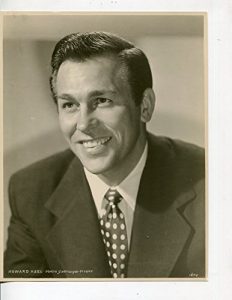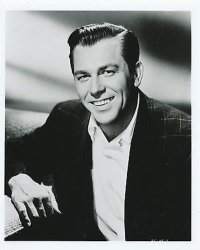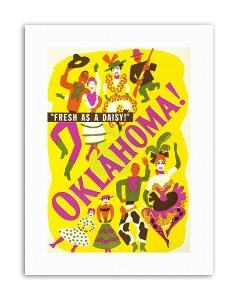Howard Keel (April 13, 1919 – November 7, 2004) was an American actor and singer. He starred in many film musicals of the 1950s.
Early years of Howard Keel
Howard Keel was born Harold Clifford Keel in Gillespie, Illinois. His parents were Navyman-turned-coalminer Homer Keel and his wife, Grace Osterkamp Keel.
Young Harold spent his childhood in poverty. One of his teachers, Miss Rosa Burke, noticed one day that he was not eating lunch. From that day forward, Miss Burke would pack two lunches – one for herself and one for Harold. When he became famous and would perform near Gillespie, Burke always received tickets to attend his performances.
After his father’s death in 1930, Keel and his mother moved to California. There, he graduated from Fallbrook High School at the age of 17. He took various odd jobs until finally settling at Douglas Aircraft Company, where he became a traveling representative.
Career and personal life of Howard Keel
At the age of 20, his landlady, Mom Rider, heard him singing. She encouraged him to take vocal lessons. One of Keel’s musical heroes was the great baritone Lawrence Tibbett. Howard would later remark that learning that his own voice was a basso cantante was one of the greatest disappointments of his life. Nevertheless, his first public performance was in the summer of 1941. He played the role of Samuel the Prophet in Handel’s oratorio Saul (singing a duet with bass-baritone George London).
Marriage and early career
In 1943, Keel met and married his first wife, actress Rosemary Cooper. In 1945, Howard Keel was briefly an understudy for John Raitt in the Broadway hit Carousel. Then, he was assigned to Oklahoma! During this period, Keel set an unusual record. He performed the leads in both shows on the same day.
Then in 1947, Oklahoma! became the first American postwar musical to travel to London, England. Harold joined the production. On the opening night, 30 April, at the Drury Lane Theatre, the capacity audience (which included the future Queen Elizabeth II) demanded fourteen encores. Howard Keel was hailed as the next great star. He became the toast of London’s West End.
Divorce and remarriage
During the London run, his marriage to Rosemary ended in divorce. Howard Keel fell in love with a young member of the show’s chorus, dancer Helen Anderson. They married in January 1949 and, a year later, Harold — now called Howard — became a first-time father to a daughter, Kaija.
While living in London, Keel made his film debut as Howard Keel at the British Lion studio in Elstree, in The Small Voice (1948). It was released in the US as Hideout. He played an escaped convict holding up a playwright and his wife in their English country cottage.
Additional Broadway credits include Saratoga, No Strings, and Ambassador. He appeared at The Muny in St. Louis, MO as General Waverly in White Christmas (2000), Henry Higgins in My Fair Lady (1996); Emile de Becque in South Pacific (1992), and Adam in Seven Brides For Seven Brothers (1978).
Howard Keel was a devout Methodist.
MGM years of Howard Keel
After London’s West End, Howard ended up at Metro-Goldwyn-Mayer. He made his film musical debut as Frank Butler in Irving Berlin’s Annie Get Your Gun (1950).
Howard’s MGM career was to become a frustrating business. MGM never seemed to know quite how to use him. Besides his plum film roles in Show Boat (1951), Kiss Me Kate (1953), Seven Brides for Seven Brothers (1954), and Kismet (1955), he was forced into a series of unremarkable musicals and B-films. On loan at Warner Brothers, Keel played Wild Bill Hickok in Calamity Jane (1953). It was a highly popular Oscar-winning musical starring Doris Day in one of her most famous screen roles. The film was Warner Brothers’ answer to Annie Get Your Gun, and included the smash hit song Secret Love.
There were two more children born to Howard and Helen, daughter Kirstine in 1952 and son Gunnar in 1955. Soon after, Howard returned to his first love: the stage.
1960s and early 1970s for Howard Keel
As America’s taste in entertainment evolved, finding jobs became more difficult for Keel. The 1960s held limited prospect for career advancement, and consisted primarily of nightclub work, B-Westerns and summer stock. Due to his declining career, Keel began to drink heavily, and his marriage to Helen crumbled. They divorced in 1970.
Divorce and remarriage
1970 turned out to be more fortuitous for Howard. He went on a blind date with airline stewardess Judy Magamoll. She was 25 years his junior and had never even heard of him. Years later, Howard would call the relationship love at first sight, but the age difference bothered him tremendously. For Judy, however, it was not a problem. With the aid of Robert Frost’s poem “What Fifty Said”, she convinced him to proceed. They married in December 1970. And his drinking problem soon ceased thereafter. He resumed his routine of nightclub, cabaret and summer stock jobs with his new wife at his side. In 1971-72, appeared briefly in the West End and Broadway productions of the musical, Ambassador, which flopped.
Then, in 1974, Howard became a father for the fourth time, to daughter Leslie Grace.
The Love Boat, Dallas, and Howard Keel’s revived career
Howard Keel continued to tour, his wife and daughter in tow. But by 1980 he had endured enough career struggle. He moved his family to Oklahoma, intending to join an oil company. They had barely settled there when Howard was called back to California to appear with Jane Powell on an episode of The Love Boat. While there, he was told that the producers of the smash hit television series Dallas wanted to confer with him. After several cameo appearances, Keel joined the show permanently as the dignified (if hot-tempered) oil baron Clayton Farlow. And his acting career was highly successful once again.
Recording career
With renewed fame, Keel commenced his first solo recording career at age 64, as well as a wildly successful concert career in the UK. He released an album in 1984 called With Love, which sold poorly. In January 1986, he underwent double heart bypass surgery.
After Dallas he continued to sing. In 1994, he and Judy moved to Palm Desert, CA. The Keels were always active in charity events, helping their community and were well loved amongst the residents. Howard and Judy attended the annual Howard Keel Golf Classic at Mere Golf Club in Cheshire, England, which raised money for the National Society for the Prevention of Cruelty to Children (NSPCC). He attended for many years, up until the year of his death.
Death of Howard Keel
Howard Keel died at his home in Palm Desert on November 7, 2004, six weeks after being diagnosed with colon cancer. He is survived by Judy, his wife of 34 years, his four children, ten grandchildren and a great-granddaughter. He was cremated and his ashes scattered at various favorite places including Mere Golf Club, Liverpool John Lennon Airport, and in Tuscany, Italy.
Family of Howard Keel
Howard Keel had four children, three with second wife Helen Anderson — two daughters, Katija Liane (born January 14, 1950) and Kirstine Elizabeth (born June 21, 1952), and a son, Gunnar Louis (born June 3, 1955) — and one with his third wife Judy — a daughter, Leslie Grace (born September 1, 1974).





